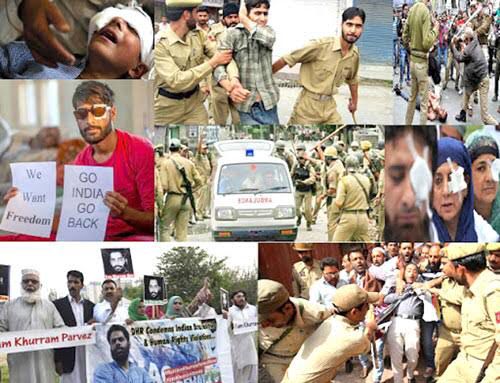Human rights violations are being committed in Indian Illegally Occupied Jammu & Kashmir (IIOJK) under the guise of curfews, lockdowns, raids and fake encounters. India’s illegitimate occupation of the Kashmir valley in 1947 has since remained the cause of constant and sometimes escalating tension in the South Asian region. Under the existing Bharatiya Janata Party’s government, Indian authorities based on their Hindu nationalist policies are making the situation worst for the inhabitants of Kashmir due to their affiliation with Islam. There are a number of cases, 151 incidents of killing in 2022, in IIOJK where Indian forces are brutally killing youngsters, children and women. The highest figure pertaining death toll of civilians assessed by the Jammu and Kashmir Civil service society disclosed that around 160 people were killed by various elements in IIOJK in 2018 alone, of these 160 people, 31 were identified as children aged between 1-17 years.
In addition to political repression and restrictions on freedom of speech, mass executions, enforced disappearances, torture, rape, and sexual assault are among many human rights violations occurring across IIOJK. A number of law enforcement agencies, including the Indian Army, Central Reserve Police Force (CRPF), and Border Security Personnel (BSF) have been globally called out for gravely violating the human rights of Kashmiri people. Since 1989, more than 100,000 individuals have been killed by the Indian forces in Kashmir, as per reports by human rights organizations. According to a US State Department investigation in 2010, the Indian army remained engaged in extrajudicial murders of civilians in IIOJK.
Amnesty International reports that since the repeal of Article 370 in 2019, Indian government’s persecution in the area has increased and at least 60 incidents of human rights violations have been recognized.Some reports claim that Indian security forces have slaughtered hundreds of citizens including women and children, while disguising the executions as fake encounters. Indian government official statistics show that from April 2020 to March 2022, IIOJK had the highest percentage of police-related fatalities in India. According to media outlets, armed factions murdered at least 19 individuals in 2022, of which 7 belong to the local Hindu minority population.
Similarly, on January 17, 2023, two youngsters were killed by Indian troops during a fake encounter in the Budgam district. Subsequently on January 5, 2022, Indian soldiers killed three Kashmiri teenagers in the Pulwama area of Jammu and Kashmir. On June 12, 2021, soldiers killed three Kashmiri youths in the Uri region of Baramulla. On November 15, 2021, four unarmed people were killed by the Indian army after a fake encounter in Hyderpora. On November 24, 2021, a fake encounter in Srinagar city claimed the lives of three more Kashmiris. Imtiyaz Ahmad Dar was killed in a fake encounter on October 12, 2021 in the hamlet of Gund Jahangir. On December 25, 2021, Indian forces killed four more youngsters in south Kashmir as part of new acts of state terrorism. On July 18, 2020, Indian army killed three laborers from Kashmir in a fake encounter in Shopian for a bounty of 20 lakh (US$25,000) set by the Indian army.
Reportedly, Indian security officers confessed to Human Rights Watch that fake encounters were common in IIOJK and that they were encouraged by rewards and promotions in Indian forces. Besides killing of innocent Kashmiris for rewards, Indian army officers are also allegedly smuggling narcotics and weapons to flatter senior officers and for professional gains. On November 28, a video of Indian Army soldier was shot by a civilian in the village Panjtaran (1.6 Km from Line of Control) while trying to hide cache of arms near his house for subsequent recovery operations.
Indian security forces have also carried out several notorious mass killings like Gawakadal massacre (51 Killed), Handwara massacre (25 Killed), Zakoora and Tengpora massacre (33 Killed), Hawal massacre (60 Killed), Bijbehara Massacre (51 Killed) and Kupwara massacre (27 Killed). Moreover, during all these years there were countless incidents involving violence against humanity in IIOJK.
Additionally, human rights organizations accused Indian security forces with deploying child soldiers to complement their vile agendas. In a WikiLeaks report, the International Committee of the Red Cross (ICRC) claimed that Indian security personnel has been physically torturing captives by beating, electrocuting, and abusing them sexually. Security personnel have been accused by Amnesty International of abusing the Armed Personnel Special Powers Act (AFSPA), which gives them the authority to “hold prisoners without trial.” Human Rights Watch claims that the military tribunals in India were often found to be incapable of handling matters of significant human rights violations and were accountable for obscuring evidence and defending the accused officers.
Despite hardship and terror, Kashmiris are firm believers in their struggle against Indian aggression. Their resistance against occupation worries India, that eventually the undoubting spirit for freedom will prevail. India is vehemently attempting to convince the world that the situation in the disputed region has been normalized, despite the fact that Kashmiris frequently endure torture, extrajudicial killings, house arrest, fake encounters, sexual assault on Kashmiri women, and journalist abductions
As peace in the region remains a far fetched dream for its citizens, Pakistan will continue pursuing their right to self-determination on any and all multilateral international forums. The international community has a collective responsibility to hold India responsible for its decades-long reign of terror in the Kashmir valley and provide a sustainable future to people fighting every day for the freedom of their motherland.








